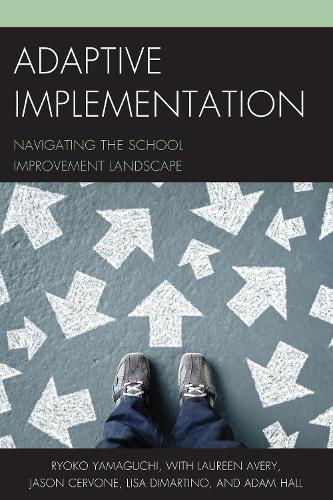
Adaptive Implementation: Navigating the School Improvement Landscape
(Paperback)
Available Formats
Publishing Details
Adaptive Implementation: Navigating the School Improvement Landscape
By (Author) Ryoko Yamaguchi
With Laureen Avery
With Jason Cervone
With Lisa DiMartino
With Adam Hall
Bloomsbury Publishing PLC
Rowman & Littlefield Publishers
21st July 2017
United States
Classifications
Professional and Scholarly
Non Fiction
Educational administration and organization
371.2
Physical Properties
Paperback
112
Width 150mm, Height 229mm, Spine 9mm
177g
Description
After decades spent pondering basic questions about adopting or implementing best practices in education, educators have assembled a canon of evidence-based strategies and programs that should consistently produce good outcomes. So why is the work of educating students still such challenging work for so many The best, most skilled educators adapt programs every day to meet the changing needs of their students. One size does not fit all, and one textbook, teaching strategy, or program will never meet the needs of all teachers and learners. Adaptive Implementation: Navigating the School Improvement Landscape focuses on how practitioners and researchers together continue to improve their craft by systematically collecting data on adaptations, testing them out, and figuring out what works. We provide a framework for building an adaptive implementation process in education, with tools and templates for practitioners to use. In the end, we hope that this book sparks a dialogue among educators as they continue to create adaptive implementation processes that work for their context.
Reviews
For those of us who seek to advance an improvement science in education, this book promises an important contribution. It is conceptually rigorous, practically feasible, and methodologically transparent. It addresses one of the most widespread and common of improvement challenges -- how to get good ideas to work in practice, even across diverse contexts. It is a science. But dont be afraid of it, it is the answer to the problem of how practitioners can get good answers to their problems. -- Paul LeMahieu, senior vice president for programs, Carnegie Foundation for the Advancement of Teaching and graduate faculty, University of Hawaii - Mnoa
Early-stage innovation requires a thoughtful approach to real-world experimentation and continuous improvement. Adaptive innovation builds on what is already known, but with the flexibility needed to succeed. -- Patrick Lester, director, Social Innovation Research Center
Adaptive Implementation is an insightful framing of how the real work of school improvement can take root It sets the tone for melding the respective agendas of researchers and practitioners in a meaningful way. -- Christopher P. Clouet, superintendent, Shelton (CT) Public Schools
The Adaptive Implementation Process is informing our way of work in the School District of Palm Beach County. There is an ever-increasing need for researchers and practitioners to deliver rapid solutions, while informing the work through a collaborative cycle. The AIP offers a practical solution for field-based implementation, particularly in large-sized districts. -- Dana Z. Godek, Director of Federal and State Programs, School District of Palm Beach County (FL)
Author Bio
Ryoko Yamaguchi is a social scientist and former special education teacher with over 25 years of experience in K-12 education serving disadvantaged students as a practitioner, researcher, parent leader, and advocate. Dr. Yamaguchi has advised state and local education policy makers, school and teacher leaders, school board members, and community and parent leaders across the country on effective school practices to increase student learning and ameliorate achievement gaps. Laureen Avery leads the work of UCLAs Center X efforts in the Northeastern US, and has more than 30 years of experience in K-12 public education as a researcher and practitioner. Avery developed and leads whole school improvement programs focused on improving outcomes for English learners and at-risk students. Jason Cervone is the Northeast Region Project Director for UCLA Center Xs Project ExcEL Leadership Academy. He has over a decade of experience in public education as a researcher, advisor, and evaluator, focusing on improving instruction for English Learners. Lisa DiMartino is a former Program Manager for UCLA Center X, Northeast Region, and is currently pursuing her doctoral degree at Lesley University. DiMartino has over fifteen years of experience working with educators, administrators, and community organizations to improve student achievement through professional development and program evaluation. Adam Hall is an education research and policy consultant. He has served the education community as an evaluator, technical assistance provider, and professional developer for over 20 years.
